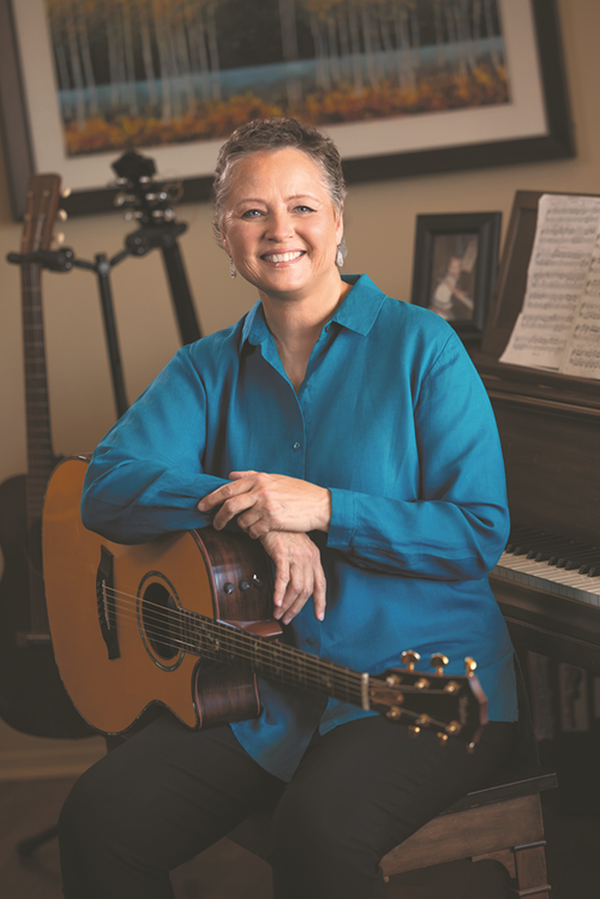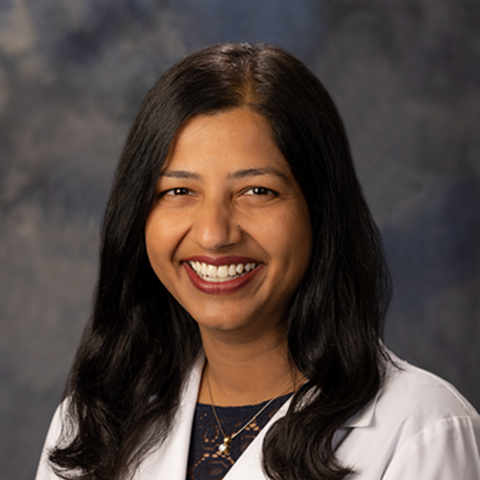A Rare Breast Cancer, A Hopeful Outcome

She’s an accomplished singer-songwriter-musician, beloved sister and friend, healthy food devotee, nature lover, COVID long-hauler, and former editor of this magazine.
Now, after nearly a year of grueling treatment for a rare form of breast cancer, she adds cancer survivor to her list of achievements.
Johnson’s cancer journey began with a routine mammogram in August 2024.
“I retired [as editor of Eisenhower Healths Healthy Living magazine] on May 24 of last year and scheduled my yearly mammogram for that August,” she recalls. “Afterward, I got a call saying they wanted to do a follow-up mammogram. I figured it was probably calcifications or a mistake since I had no family history of breast cancer.”
After a second mammogram and an ultrasound, a biopsy was recommended and scheduled for September 4.
“While waiting alone in a room before the biopsy, I closed my eyes and thought of my mom who’d died the previous December,” Johnson says. “I imagined her holding my hand and said to her, ‘Mom, I’m taking you in there with me; you went through two cancers and know how to do this. Please help me.’”
Five days later, Johnson’s Board Certified Gynecologist Michelle Stoltzman, MD, asked Johnson to come into the office to go over the biopsy results.
“I knew something was up when she wanted to talk in person,” Johnson says. “She told me that they were pretty sure it was breast cancer but because the tumor was so small, there wasn’t enough tissue in the biopsy sample to identify what kind.
She’d already arranged for me to see Dr. Vulchi that afternoon to discuss next steps.” Manasa Vulchi, MD, is a Board Certified Medical Oncologist who specializes in treating breast cancer at Eisenhower Lucy Curci Cancer Center.
“Dr. Vulchi reassured me that ‘we’re going to take care of this,’” Johnson continues. “That same week, I had an MRI, bloodwork and I saw Dr. Staren,” she says, referring to Edgar Staren, MD, PhD, who is Board Certified in Surgery and specializes in breast surgical oncology.
Johnson underwent surgery - a lumpectomy and sentinel lymph node biopsy - on October 8, 2024. The pathology revealed that she had triple-negative breast cancer (TNBC), but it was confined to the small tumor in her breast.
“I was gobsmacked that I had that type of breast cancer,” Johnson admits. “The only reason I knew what it was is because my best friend had been diagnosed with it eight years earlier. When I looked it up back then, I learned it was not a good cancer to have.”
“Triple-negative breast cancer is a more aggressive type of breast cancer that is fairly rare, accounting for only 10 to 15% of breast cancers,” explains Dr. Vulchi. “The unique thing about it is that it lacks three common receptors, or proteins, known to fuel breast cancer growth: estrogen (ER) and progesterone (PR) hormone receptors, as well as human epidermal growth factor receptor 2 (HER2).”
This means that traditional hormone-based or targeted therapies aren’t effective in treating this type of breast cancer.
“The treatment for triple-negative breast cancer is a combination of surgery, chemotherapy and radiation,” Dr. Vulchi says. “More recently, immunotherapy is an option for higher-risk patients, but Deborah didn’t fall into that category.”
In fact, Johnson had several factors in her favor.
“Hers was a small tumor, there was no lymph node involvement - indicating that the cancer had not spread - and it was detected very, very early thanks to imaging,” Dr. Vulchi says.
Recovered from surgery, Johnson began an arduous six-month chemotherapy regimen in mid-November. A two-drug combination - the most up-to-date protocol currently available for early-stage TNBC - was administered via infusion once a week for three weeks, followed by a week off. Each infusion session took four to five hours and included a pre-chemo cocktail of medications to ameliorate side effects such as nausea and acid reflux.
Hair loss is another common effect of chemotherapy. Eisenhower offers a scalp cooling therapy (cryotherapy) in which the patient wears a “cold cap” before, during and after each chemotherapy session. This constricts blood vessels in the scalp, which limits the amount of chemo drugs reaching hair follicles. Studies have shown that a significant percentage of patients using cold caps experience less hair loss versus those who don’t. Johnson, however, didn’t want to wait and see; she opted to shave her head after her first infusion.
Another risk of paclitaxel (Taxol®)-based treatment (one of the powerful drugs Johnson received) is chemotherapy-induced peripheral neuropathy (CIPN), nerve damage that can cause pain, numbness, tingling and weakness in the hands and feet.

Despite cryotherapy, Johnson began to experience CIPN in her feet about four months into her chemotherapy regimen. Rather than risk the neuropathy worsening or extending to her hands - anathema to a musician - Dr. Vulchi told Johnson that while she’d initially prescribed six months of chemo if she could tolerate it, four months would be acceptable and not compromise her outcome. So, she finished chemotherapy at the end of February, took a few weeks off, then underwent radiation therapy five days a week for four weeks.
“Around the third week I got so tired,” Johnson says. “I also had a lot of brain fog, but I think that was my long COVID.” She completed radiation treatment at the end of April.
While cancer treatment’s physical impact can be daunting enough, it also packs an emotional punch.
“Looking back, there was a lot to deal with,” Johnson says, “and when you’re in the midst of it, it’s traumatic. But frankly, I think my breast cancer diagnosis may have affected me more if I hadn’t had long COVID. That has changed my life permanently. I don’t get to move on from that. So, it somehow softened the blow of my cancer diagnosis - ‘oh, breast cancer, at least it’s not long COVID.’ I figured, I can do this. I’ll be out of commission for a while, but I can get over it.
“I also made a purposeful choice to stay upbeat and keep a sense of humor as much as possible,” she adds.
One of the ways she did so was through CaringBridge, an online platform where individuals create their own page to share updates and connect with loved ones during a health journey.
“It was a great way to get information to friends and family without being inundated with calls and texts,” she relates. “As a writer, it was a great outlet, therapeutic. I was honest about what was going on but I also had some fun with it.”
Does life look different as a cancer survivor?
“Yes,” she says. “I’m appreciating every day more than ever. I have a sensitivity toward other people who had or have cancer; I know what they’re going through. It also makes me want to not waste time and to think about what’s really important - and do those things.
“One of those things is just having quieter mornings,” she continues.
“I spend time outside watching the birds, reading poetry. I love being in touch with family and friends, and being out in nature. And I recently bought an electric drum set - something I’ve been wanting for 50 years!
Part of the cancer thing is the lesson to do it now, don’t wait.”
And, she is immensely grateful for her breast cancer team.
“I got such great care every step of the way,” she says. “Dr. Vulchi was phenomenal; she was always willing to listen and tuned into my concerns. And the infusion nurses - I can’t say enough good things about them.”
She also gives kudos to the Cancer Center’s lymphedema clinic, Shay’s Warriors Life After Cancer support group and Eisenhower’s Breast Cancer Information and Support Group.
“The Lucy Curci Cancer Center has a team that delivers truly comprehensive breast cancer care,” she says. “And that’s exactly what I’ve received.”
Learn more about breast cancer screening by visiting EisenhowerHealth.org/Breast
or by calling 760.773.2038.



